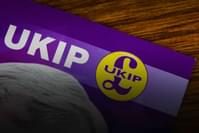
UKIP lives on!
Coverage and analysis of the general election seemed to be never-ending, but despite all the bluster and rhetoric there was another story that failed to be heard, says David Kurten.
The other story of the election night was the collapse in the UKIP vote from 3.9 million to just 0.6 million. This isn't quite as bad as it looks as UKIP only stood in 3 out of 5 seats. If UKIP had stood in all the seats in did in 2015, it would have got about 0.9 million votes – the same as in 2010. Nevertheless, 3.3 million UKIP voters switched their allegiance in 2017.
There is a fundamental difference in the reason why the Conservatives and Labour gained votes. Theresa May gained votes mainly because 2.3 million people held their noses and voted Tory to keep out someone even worse.
In England and Wales, approximately 2.0 million former UKIP voters switched to Theresa May to keep out the disaster of a Corbyn led 'coalition of chaos'. In Scotland, 0.3 million voters switched from the SNP tired of Nicola Sturgeon's endless posturing for a second independence referendum.
This leaves the curious fact of about 1.3 million voters who switched from UKIP to Labour. UKIP mainly attracted Conservative voters in the 1990s and 2000s who wanted to leave the EU, but during UKIP's surge years of 2013 – 2016 it began to unexpectedly attract more and more Labour voters. At the start of the 2017 campaign, polls seemed to indicate these voters would switch from UKIP to Theresa May because they believed she was the best hope of delivering Brexit in our 'first past the post' election system.
However as she floundered and dug up the ground on social care and pensions, and it became apparent that she was responsible for cuts in police and the NHS – things very important and valuable to these voters – they abandoned her and went all the way back to Labour, by-passing UKIP completely on the way back.
To these key voters, often referred to as the 'patriotic working class', who were the heart of Theresa May's plan to eradicate both Labour and UKIP, the Tory party became the nasty party again as Theresa May's mask fell off half way through the campaign.
Labour also attracted more than half of the Green vote. The Green party is now hardly indistinguishable from Corbyn's Labour making them largely irrelevant. Labour also took some votes from the SNP in Scotland, but did not tempt voters away from the LibDems who had an almost identical number of votes as in 2015.
Yet the one thing nobody predicted was the late surge in the young and student vote for Corbyn's Labour. 1.3 million new voters put their cross in Labour's box with a passion and enthusiasm which the robotic Theresa May could only dream of. The young vote was higher than the national vote for the first time in living memory. This is partly for a reason that is occluded from the mainstream.
There has been much talk in the last couple of years of the so-called 'alt-right': internet pundits, journalists and outlets, which have helped the cause of Brexit and spread positive messages about Trump in the USA.
The left was reeling after the Brexit referendum and Trump's victory, but has looked at the success of the 'alt-right' and started to mimic it. It has created a new internet scene known as the 'alt-left' growing huge followings on their websites and Facebook and YouTube pages. All of these outlets are anti-establishment, but attack the establishment from two different directions.
While the alt-right in the UK used to be attached very firmly to anti-establishment UKIP, with the departure of Nigel Farage in July 2016 this relationship has not been so comfortable. It has also been in the strange predicament of having to support the establishment figure Theresa May to deliver Brexit, the greatest anti-establishment achievement for centuries.
The alt-left in the UK however, has been very happy to hitch its wagon to the Corbyn train. Corbyn has re-invented Labour as an insurgent anti-establishment party, and inspired 1.3 million young alt-left reading voters to go out and vote for him.
Theresa May said she needed an election to get her own mandate, but she failed to get it. She will survive in the short term but is unlikely to be able to limp on for more than a few months. The next Conservative leader may also want to seek a mandate with a new manifesto to put right the failures of the last one.
UKIP will also have a new leader after the departure of Paul Nuttall the day after the election.
New leadership in both UKIP and the Conservative parties together with the growing influence of the alt-right and alt-left could make the next election just as unpredictable as the last one.









